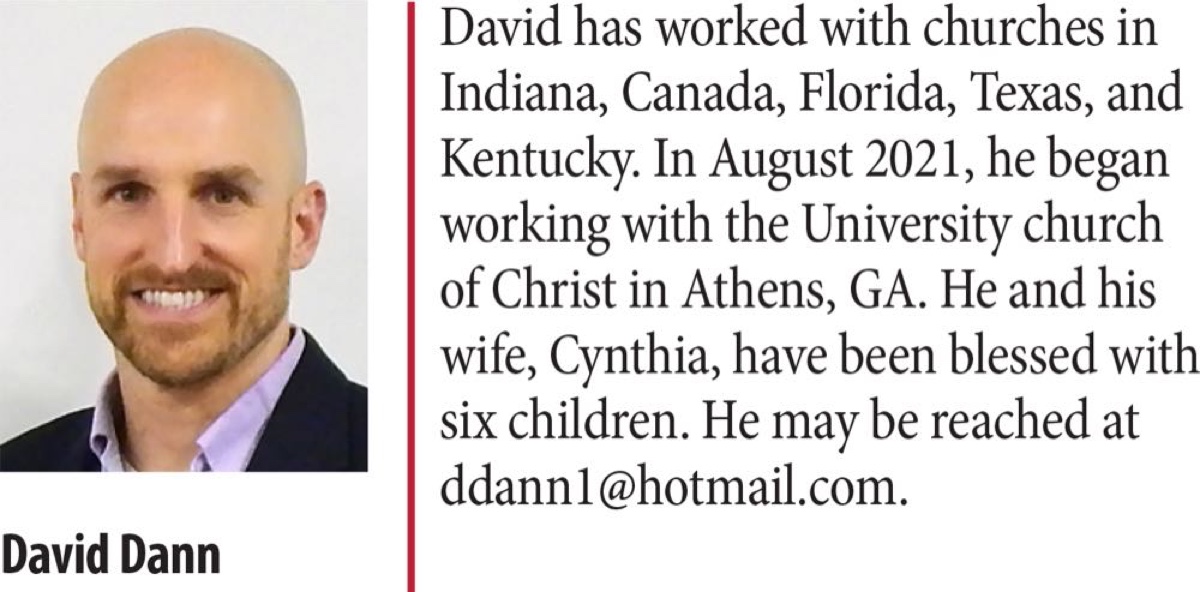By David Dann
Synopsis: Reaching the lost is about helping people hear, believe, and obey the gospel of Christ so that they came to be freed from their sins.
Most people are lost. “Few” are headed in the right direction, in contrast to the “many” who are bound for destruction (Matt. 7:13-14, NKJV). They are “dead in trespasses and sins” (Eph. 2:1) and are “alienated from the life of God, because of the ignorance that is in them, because of the blindness of their heart” (v. 18). Separated from God in sin, most people are destined for eternal misery in hell.
We should be moved with compassion and a sense of urgency, as we recognize that most of those around us are lost and destined for destruction. If you were lost, wouldn’t you want someone to help you correct your course? It is up to those who are already faithful servants of the Lord to help the lost turn from their sins and obey Him (cf. Matt. 7:12; 2 Tim. 2:24-26).
To know this is not enough. We must take action to reach the lost and bring them to salvation. However, a great deal of confusion exists over how to reach the lost. For much of the religious world, “outreach” to the lost involves offering people opportunities for entertainment, recreation, and social activities, hoping they will enjoy themselves so much that they might eventually see the benefits of joining a particular church. As a result, many people remain lost in sin, but are now part of some religious community. In order to reach the lost effectively, we must help people hear, believe, and obey the gospel of Christ so that they will be freed from their sins (cf. Acts 18:8). How can we go about reaching the lost today?
Jesus is the perfect example for us to imitate in reaching the lost: “for the Son of Man has come to seek and to save that which was lost” (Luke 19:10). Rather than waiting for the lost to find their own way to salvation, the Lord actively sought those who needed spiritual help and direction. The first step to take in reaching the lost is actively to seek those around us who are separated from God in sin so that we can show them the way of salvation. Interact with them, talk with them, engage them in a discussion of spiritual matters, and invite them to learn about the Lord. Let us imitate the Master by seeking the lost in order to lead them to salvation.
Jesus said, “The harvest truly is plentiful, but the laborers are few. Therefore, pray the Lord of the harvest to send out laborers into His harvest” (Matt. 9:37-38). While we may complain that no one seems to be interested in the gospel anymore, there are opportunities all around us. Who are the lost? Our neighbors, co-workers, fellow students, people with whom we do business, those we interact with each week, and perhaps even members of our own families. Some of them are living immoral lives, some are viewed as being good people, some are even religious, while others are atheists or agnostics, and many are just confused. It is up to us to invite them to investigate the message of the cross. We need to imitate the Savior by seeking those who are lost in sin in order to lead them to repentance and salvation (Mark 2:17).
All lost people need the gospel, but they are not all prepared to start at the same place. Philip could preach Jesus to the Ethiopian “beginning at this Scripture” (Acts 8:35) because the Ethiopian already worshiped the true God and believed the Scriptures. At the synagogue, Paul “reasoned with them from the Scriptures, explaining and demonstrating that the Christ had to suffer and rise again from the dead” (17:2-3) because they shared a common foundation in the prophets who foretold the coming of Jesus. On the other hand, when encountering pagans, Paul had to begin with, “God, who made the world and everything in it” (17:24) in an effort to establish common ground—i.e., a starting point. Paul challenged Felix with the reality of “judgment to come” (24:25) as a foundation from which to work. However, when dealing with Agrippa, the same apostle found more of a common religious foundation from which to begin, saying, “King Agrippa, do you believe the prophets? I know that you do believe” (26:27). The New Testament serves as an instruction manual for finding a common foundation from which to teach the lost.
The goal is to take this lost person from where he is to where he needs to be by leading him to believe and obey the gospel so that he will be saved. As Paul puts it, “I have become all things to all men, that I might by all means save some” (1 Cor. 9:22). If you are trying to reach someone who already believes in God, believes that Jesus is the Son of God, and believes the Bible is the word of God, then you have a very solid foundation to work with as you show what the Bible teaches one must do to be saved. If you are trying to reach someone who isn’t convinced that the Bible is God’s word, then you’ll have to establish that fact before moving on to what the Bible says one must do to be saved. Find out what this individual believes, spend time in prayer, and use wisdom and good judgment in working to bring this lost soul from where he is to where he needs to be in understanding and obeying the gospel. The inspired wise man points out that “he who wins souls is wise” (Prov. 11:30). We need to put forth the effort to start from a common foundation in order to be as effective as possible in reaching the lost.
Paul writes, “For I am not ashamed of the gospel of Christ, for it is the power of God to salvation for everyone who believes, for the Jew first and also for the Greek” (Rom. 1:16). The message of the loving Savior who laid down His life at the cross in order to redeem humanity from sin is the power that God uses to convert the soul. Reaching the lost is not about catering to man’s physical or social desires, nor is it about helping people experience earthly success so they can live a better, more enjoyable life. Instead, the focus is on presenting a message of salvation from sin to those who are desperately in need of reconciliation with God. For those who are truly seeking, the gospel message is the sword of the Spirit that pricks the heart of the sinner so that he is turned to the Lord. Place your confidence in the gospel to accomplish its work.
To reach the lost and bring them to salvation, God’s plan must be presented in a simple manner so that people are led to understand, believe, and obey it. The lost should be shown from Scripture how sin entered the world in the garden of Eden and how God carried out a plan to save man from sin through the sacrifice of His Son. They need to be shown what the Bible teaches about sin, salvation, the church, the two covenants, Bible authority, and man’s eternal destiny. It is our job to help them understand that, in order to benefit from the sacrifice of Christ, they must repent and be baptized into Christ (Acts 2:38). The souls of sinners are purified “in obeying the truth” (1 Pet. 1:22). We need to present the plan of God to the lost so that they will be convicted to comply with the conditions He has set in order to receive salvation.
Jesus said, “Likewise, I say to you, there is joy in the presence of the angels of God over one sinner who repents” (Luke 15:10). No work in this world is greater and more urgent than reaching the lost with the saving message of Christ. Seek them out, find a common foundation from which to begin, and present God’s plan in all of its power and simplicity. Will you join in the work?


